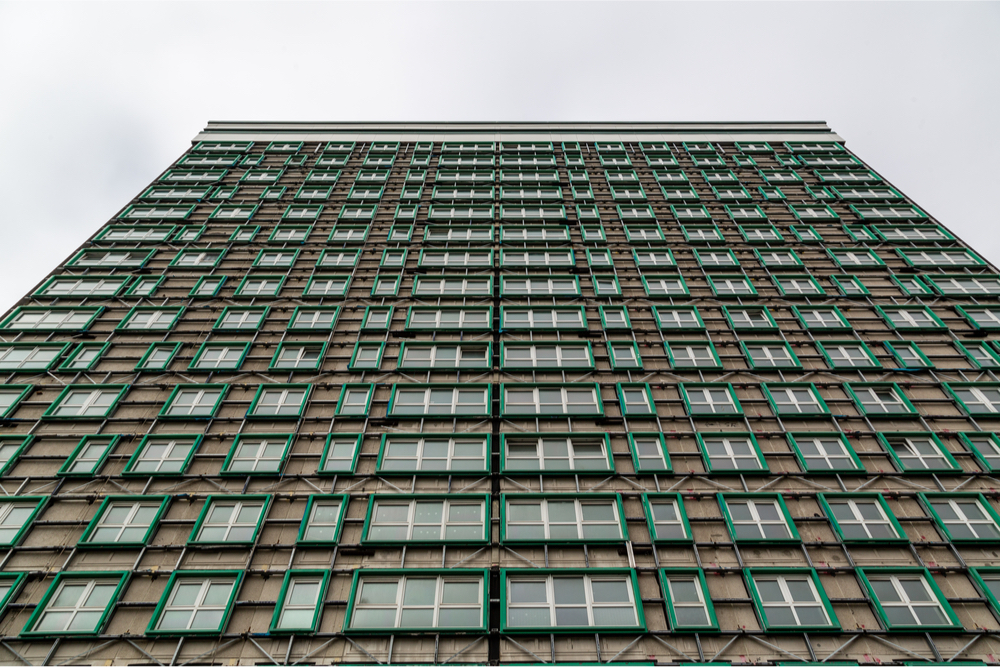
by Kim Pidgeon | Jun 12, 2024 | News
The organisation has calculated the economic and social contributions made by social housing
The UK’s housing crisis has seen building starts rapidly decline while waiting lists for social housing soar. In London alone, over 320,000 households are awaiting social tenancies.
New research has calculated that providing social housing for households on London’s waiting list would inject at least an additional £7.7 billion a year into the UK’s economy.
The G15, which represents London’s largest not-for-profit housing associations, has conducted research focusing on the whole of London which quantifies the economic and social contributions made by social housing using Hyde and Sonnet Impact’s Value of a Social Tenancy (VoST) model. These contributions range from rent savings to the value of increased job and education opportunities, crime reduction and savings to the NHS.
In London, housing associations currently provide 289,000 social rent homes. The findings reveal that each of these homes contributes an average of at least £23,777 in value annually, totalling over £6.86 billion every year.
Providing new social tenancies for the 323,800 households on the capital’s social housing waiting list would inject at least an additional £7.7 billion a year into London and the UK’s economy.
The G15 says the housing crisis has left not-for-profit housing associations unable to invest in the new homes so desperately needed while also investing in existing stock to ensure standards meet the needs of residents and Government.
With the construction of new homes grinding to a halt, the real value of London’s social homes is being missed.
“We’re a nation obsessed by house prices but few people and even fewer politicians appreciate the real value created by London’s social homes’, says G15 Chair Fiona Fletcher-Smith.
“Political parties would do well to remember, as they write their manifestos, that London is built on a vibrant mix of people from all walks of life. Providing homes for those that need them most is an asset, not a cost, creating all kinds of social and economic benefits.”
There are 655,000 social rent homes in London, almost half of which (44%) are provided by housing associations.
The study looks at the social value of providing social housing, including higher employment, crime reduction, education and benefits to the NHS.
Building across the country is in a steep decline, with housing associations starting work on just 6,990 homes in the second half of 2023, compared with 16,270 the previous year. And in London, G15 data shows their members are expected to start work on 1,769 affordable homes in London this year, down from 7,363 last year.
Role of Housing Associations
Housing associations are not-for-profit organisations set up to support people in housing need with homes at below-market rent. All the money they make is reinvested into building more affordable homes and delivering services for their residents.
The services provided are increasingly relied upon by residents, and range from domestic violence refuges, homeless hostels through to community centres and training and apprenticeships programmes.
All areas have seen dramatic cuts from local authorities in recent years, putting even greater pressure on the housing associations.
Three-quarters of the £400,000 cost of a new home is covered by housing associations, with borrowing against current and future rental income making up a large slice.
However, the G15 says decisions by Housing Ministers on how rental income is calculated have made it increasingly difficult for associations to secure the long-term investment they need to build and also undertake refurbishment programmes on existing homes to ensure building safety and achieving net zero requirements by 2050.
It also states, the Government’s 7% rent cap coupled with inflation and interest rates is the final nail in the coffin, forcing housing associations to drastically cut back on building despite the housing crisis.
“Time has run out for the current government to get its own house in order when it comes to social housing,” said Fletcher-Smith.
“Whoever forms the next Government could immediately begin to address the housing crisis by applying consistency to areas like the rent settlement. This simple act would give housing associations the financial certainty we need to keep borrowing and investing in Londoners and the UK.
“Despite the valuable contributions that social homes make, successive Conservative Governments’ indecision means there is little room to grow for housing associations, their residents and London.
“Housing associations provide almost half of London’s existing affordable homes and are the engine of potential new homes. A few tweaks by the next Government, at no cost to them, will help us get on with the job of maintaining existing and building new homes, all while helping revitalise and regenerate communities, address stigma and providing a springboard for people into education and employment.”

by Kim Pidgeon | Dec 14, 2023 | News
The housing association have phased our their programmes but will continue to provide support services
After more than 30 years, A2Dominion has completed its withdrawal from providing care services and will refocus on core housing objectives.
The London and southern-England-based housing association owns or manages over 38,000 homes and has 1748 homes in development.
The social landlord, who provided domiciliary care services for more than three decades, began phasing out four programmes in Berkshire and Surrey at the start of 2023 amid what it describes as ‘growing challenges faced by the wider care sector’.
Michael Reece, chief property officer at A2Dominion, said: “We’d like to thank all our colleagues, partners and everyone else involved in helping us to deliver high-quality care services to our customers over many years.
“It was not a decision we took lightly and as a housing association with a social purpose we remain committed to helping those in vulnerable circumstances in any way we can, including through retirement living, our supported services and community investment programmes.
“Looking ahead our core focus remains unchanged and we will continue to work hard to deliver for all our customers and provide homes people love to live in.”
The HA says its Specialist Housing team will continue to provide vital support services, including for young people and parents, students and key workers, as well as those at risk of domestic abuse and homelessness.
As part of the business changes, a new director will be appointed to lead the Specialist Housing team, with the existing post-holder Jo Evans moving to become the first Director of Repairs and Maintenance.
The G15 housing association commissioned a review into its care and support services in 2022 against a backdrop of growing pressure on the wider sector over funding and labour.
It says: “The Group board made the tough decision to exit amid the squeezed margins involved in delivering front-line services.
“In our new corporate strategy, we outlined our commitment to providing value-for-money to customers, stakeholders and investors, and we were not prepared to compromise on the quality of service.”
A2Dominion says it worked closely with the local authorities in Reading, Spelthorne and Woking to ensure a smooth transition of its domiciliary care provision that provided personal care and practical support, including assistance with medication, to those in need.
The four tenders were transferred to new providers at the natural end of the contract and the business retains a significant interest in services going forward as it continues to manage the buildings where care is provided.

by Simon Fitzsimmons | Jan 15, 2022 | News
The G15 has released a response to the newly announced measures concerning building safety.
It comes after Michael Gove, the Secretary of State for Levelling-Up, Housing, and Communities, laid out a new plan, including measures to protect leaseholders amid the cladding crisis.
Mr Gove guaranteed that guarantee that “no leaseholder living in their own flat will pay a penny to fix dangerous cladding”, and outlined a four-point plan to reset the government’s approach:
- Opening up the next phase of the Building Safety Fund to drive forward taking dangerous cladding off high-rise buildings, prioritising the government’s £5.1 billion funding on the highest risk
- Those at fault will be held properly to account: a new team is being established to pursue and expose companies at fault, making them fix the buildings they built and face commercial consequences if they refuse
- Restoring common sense to building assessments: indemnifying building assessors from being sued; and withdrawing the old, misinterpreted government advice that prompted too many buildings being declared as unsafe; and
- New protections for leaseholders living in their own flats: with no bills for fixing unsafe cladding and new statutory protections for leaseholders within the Building Safety Bill
Responding to these announcements, G15 Chair, Geeta Nanda OBE, commented: “[The] statement from the Secretary of State is a welcome step in the right direction.
“We’ve consistently called for leaseholders to be protected from the costs of making sure their homes are safe, and the confirmation that no leaseholder will be asked to pay for the removal and replacement of defective or dangerous cladding in buildings over 11 metres is long overdue.
“The recognition that those responsible for causing the building safety crisis must be the ones that meet the cost of fixing affected buildings is also absolutely right.
“G15 housing associations are rigorously pursuing developers and contractors to address and fund issues that have been found with certain buildings, and we look forward to working with the Secretary of State to support his efforts in recovering costs from those responsible.
“The focus on restoring proportionality to the system is crucial and we urgently need to see further details of how the government will achieve this in coordination with lenders and insurers.
“However, as the Secretary of State has acknowledged, [the] announcements are not a complete solution for the wider building safety crisis. Issues beyond cladding continue to be found and where they pose a significant risk to safety they must be addressed.
“Not-for-profit housing associations are investing significant resources into addressing building safety issues and this has already had an impact on our ability to build much needed new affordable homes. To ensure we can continue to build the homes that are needed, as well as investing in existing homes and services for our residents, a truly comprehensive solution to this crisis is still required.”
Mr Gove has asked developers to arrange a meeting over the next few weeks, and report back before the House breaks for Easter with a fully-funded plan of action including remediating unsafe cladding on 11-18m buildings. Should industry not agree to a solution, the government says it will be forced to impose one.
Clauses in the Building Safety Bill will allow the government to introduce a levy on developers of high-rise buildings. This would build on the 4% tax on the largest, most profitable developers which was announced in this year’s Budget and is expected to raise at least £2 billion over the next ten years to help pay for building safety remediation.


